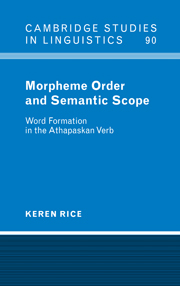Book contents
- Frontmatter
- Contents
- Preface
- 1 Introduction: Beginning the Journey
- PART I FIRST STEPS
- PART II THE LEXICAL ITEMS
- PART III THE FUNCTIONAL ITEMS
- 9 An Introduction to the Functional Elements
- 10 Pronominals
- 11 The Aspect System
- 12 Qualifiers and Their Ordering
- 13 On the Ordering of Functional Items
- PART IV A VIEW OF THE LEXICON
- PART V THE END OF THE JOURNEY
- PART VI APPENDIXES
- Notes
- References
- Name Index
- Languages Index
- Subject Index
10 - Pronominals
Published online by Cambridge University Press: 06 July 2010
- Frontmatter
- Contents
- Preface
- 1 Introduction: Beginning the Journey
- PART I FIRST STEPS
- PART II THE LEXICAL ITEMS
- PART III THE FUNCTIONAL ITEMS
- 9 An Introduction to the Functional Elements
- 10 Pronominals
- 11 The Aspect System
- 12 Qualifiers and Their Ordering
- 13 On the Ordering of Functional Items
- PART IV A VIEW OF THE LEXICON
- PART V THE END OF THE JOURNEY
- PART VI APPENDIXES
- Notes
- References
- Name Index
- Languages Index
- Subject Index
Summary
Both subject and object pronominals are found within the verb in all Athapaskan languages. Their ordering is particularly puzzling, especially when subjects are considered. As discussed in chapter 9, subjects occur in two positions in the verb, with first and second person subjects in one slot and third person subjects in another (see below for refinement of this statement). A major distinction is thus made between first and second persons, or speech act participants, and others. Why should this be the case? Objects do not appear to parallel subjects; all objects occur in the same slot. Why should subjects and objects differ in this way? Finally, while objects generally precede third person subjects, this is not always true. Why is this the case? In this chapter I address these questions concerning pronominals. I postpone discussion of the ordering of pronominals with respect to other functional items until chapter 13, focusing here on the ordering of pronominals with respect to each other.
Before beginning, a brief note on the status of these elements is in order. There is lively debate in the Athapaskan literature as to whether pronominals within the verb are pronominal arguments or functional in nature (e.g., Cook 1996, Jelinek and Willie 1996, Potter 1997, Rice and Saxon 1994, Sandoval and Jelinek 1989, Saxon 1986,1989a, b, Speas 1990, 1995, Thompson 1996b, Tuttle 1996, Willie 1991, Willie and Jelinek 1996).
- Type
- Chapter
- Information
- Morpheme Order and Semantic ScopeWord Formation in the Athapaskan Verb, pp. 180 - 245Publisher: Cambridge University PressPrint publication year: 2000



